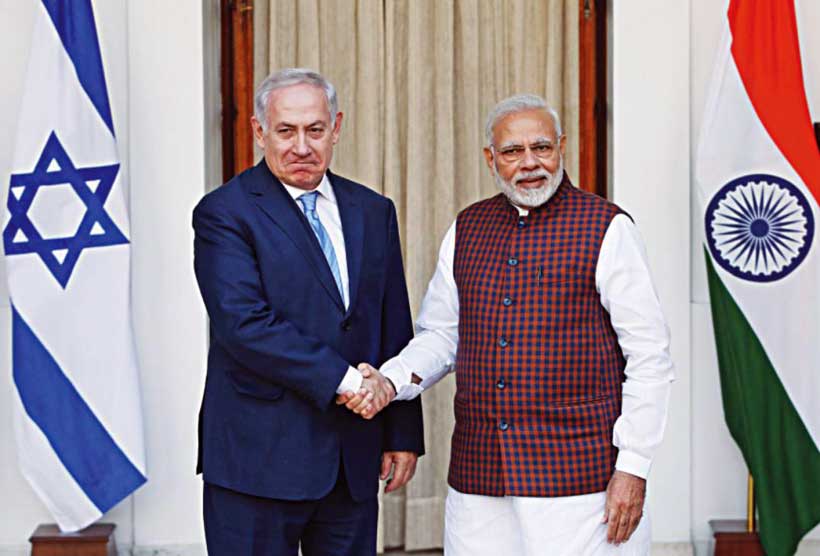India’s tilt toward Israel represents a gradual but significant evolution in its foreign policy, shifting from strong post-colonial support for Palestine to a strategic partnership with Israel. This transformation began with the establishment of formal diplomatic ties in 1992, catalyzed by the Oslo Peace Process, and grew through defense and technology collaborations, making Israel India’s second-largest arms supplier. The relationship took a visible turn under Prime Minister Modi, who in 2017 became the first Indian leader to visit Israel, followed by Netanyahu’s visit to India in 2018, symbolizing a robust bilateral partnership. This shift aligned with broader geopolitical changes in India’s Middle East policy, notably enhanced ties with the UAE, amidst the region’s warming relations with Israel, exemplified by the Abraham Accords. These developments paved the way for collaborative ventures like the I2U2 forum and the India-Middle East-Europe Economic Corridor, positioning India as a key player in shaping a “New Middle East” focused on economic and technological advancements amidst global competition.
However, in modern-day India, Israel serves as a symbol of inspiration for Hindu nationalists, who are often seen as aiming to establish a “Hindu Israel” in the country. To them, Israel embodies an ideal model for India and, more broadly, reflects the vision of nationalists globally: a well-structured state that defends itself against external threats, is advanced in technology and legal frameworks, yet preserves its traditional roots. Additionally, its ability to integrate innovation within a traditional social fabric offers a template that many Hindu nationalists believe India should follow. Ultimately, the idea of a “Hindu Israel” encapsulates the aspiration for a unified, culturally proud nation standing resilient in a complex global environment.
Stanly Johny, the International Affairs Editor at The Hindu, in his book Original Sin: Israel, Palestine and the Revenge of Old West Asia, delves into the complexities of the Palestine issue and Indo-Israel relations, asserting that the prospect of a two-state solution is practically dead. The book also examines Israel’s position on the establishment of a Palestinian state and India’s evolving foreign policy, highlighting a blend of its traditional support for Palestine and its increasing closeness to Israel, shaped by shifts in the domestic political landscape. The author further investigates the intricate dynamics of Israel’s role in a turbulent region and India’s developing ties with Israel, set against the backdrop of the global attention on the Israeli-Palestinian conflict. While officially supporting the two-state solution at the UN, India’s actions such as its robust defense cooperation with Israel and its silence on Israel’s oppressive policies highlight a contradiction with its stated commitment to Palestinian sovereignty.
India’s diplomatic tilt toward Israel, while reaping economic benefits from GCC states for energy and remittances, reflects a stark disregard for the sentiments of its Arab allies, underscoring an opportunistic prioritization of strategic interests over ethical obligations. By aligning with Israel’s hardline policies and military-industrial complex, India tacitly endorses the occupation of Palestinian territories and the systematic oppression of Palestinians, eroding its credibility as an advocate for global justice. The ideological alignment between Israel’s Zionism and the BJP’s Hindutva forms an alliance of majoritarian forces, both of which thrive on the marginalization and persecution of minorities, thereby exacerbating global injustices. Additionally, the BJP’s Islamophobic rhetoric and domestic policies align with its pro-Israel stance, framing both Palestinians and Indian Muslims, including the oppressed Kashmiris, as threats to be contained rather than as communities entitled to justice and equality.
India’s selective condemnation of terrorism, while overlooking state-sponsored violence in Palestine, exposes its duplicity and readiness to sideline international law and human rights for geopolitical advantage. By forsaking the Palestinian cause and strengthening ties with Israel, India jeopardizes its longstanding reputation as a champion of the Global South and a defender of the oppressed. This inconsistency not only alienates Arab nations but also diminishes India’s moral authority on the global stage. Consequently, Arab states may need to reconsider their diplomatic relations with India to safeguard regional peace and stability.
India’s evolving stance on the Israeli-Palestinian conflict reflects a shift from post-colonial solidarity with Palestine to closer ties with Israel, driven by national security and economic pragmatism. However, this realignment risks damaging India’s moral authority and credibility, given its contradictions between supporting the two-state solution and aligning with Israel’s hardline policies. In this complex and divided world, India’s foreign policy must chart an ethical path, positioning itself as a beacon of moral leadership. However, current diplomatic decisions raise concerns about whether India’s Foreign Policy truly upholds such values. While Israel is a significant defense partner, India’s foreign policy should not blindly mirror Israel’s actions. If India aligns with Israel’s policies without addressing the serious human rights violations in Palestine, it risks losing its credibility as the voice of the Global South. Under Prime Minister Modi’s leadership, a recalibration of India’s foreign policy is essential to restore its moral authority and global standing.
